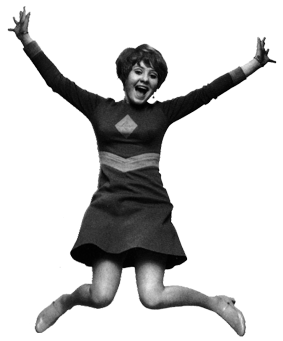| Lulu and the Luvvers |
 |
|
| Massey: "She [Lulu] looked so peculiar that first time I saw her. Her hair was in curlers underneath a fur beret. She had a terrible cold, was very pale and wore three jumpers. But I was very intrigued by her. It wasn't her singing; there was something tremendously magnetic about this girl. I knew she had the makings of a great star." |
|
 |
 |
|
| 1965 [age 16-17] |
| January. "Satisfied"/"Surprise Surprise" (Decca F12128) released. No chart action. |
| 25 May. Brighton/ITV: British Song Festival Lulu and the Luvvers appear with Elkie Brooks, Wayne Fontana & the Mindbenders, Billy J. Kramer with the Dakotas, Manfred Mann, Julie Rogers, and Mark Wynter. |
|
 |
| 1966 [age 17-18] |
| 5 January. Lulu and the Luvvers appear on BBC-1's A Whole Scene Going television program with Spike Milligan and The Who. |
| ---. "Call Me" [Decca F12326] |
| After a series of unsuccessful releases, Lulu and her management decide to take her solo and release the Luvvers. The Luvvers release an unsuccessful single and disband. Guitarist Jim Dewer eventually became Robin Trower's bassist as well as a solo artist in his own right. |
| 23 September. "What a Wonderful Feeling" [Decca F12491] released. |
| Lulu signs with EMI's Columbia and takes on Mickie Most as her producer. |
| Lulu and Most would have a string of modest hits in 1967-69. She also began appearing on stage. In 1967, she appeared in the hit film, To Sir with Love and sang the title song which would become her biggest trans-Atlantic hit. |
| Information and image
sources: www.lulu.co.uk/ groups.msn.com/TheSixtiesPleasureZone/lulu.msnw www.geocities.com/fabgear6366/lulu.htm |
| |
||
| Northerners | Schedule | Londoners |